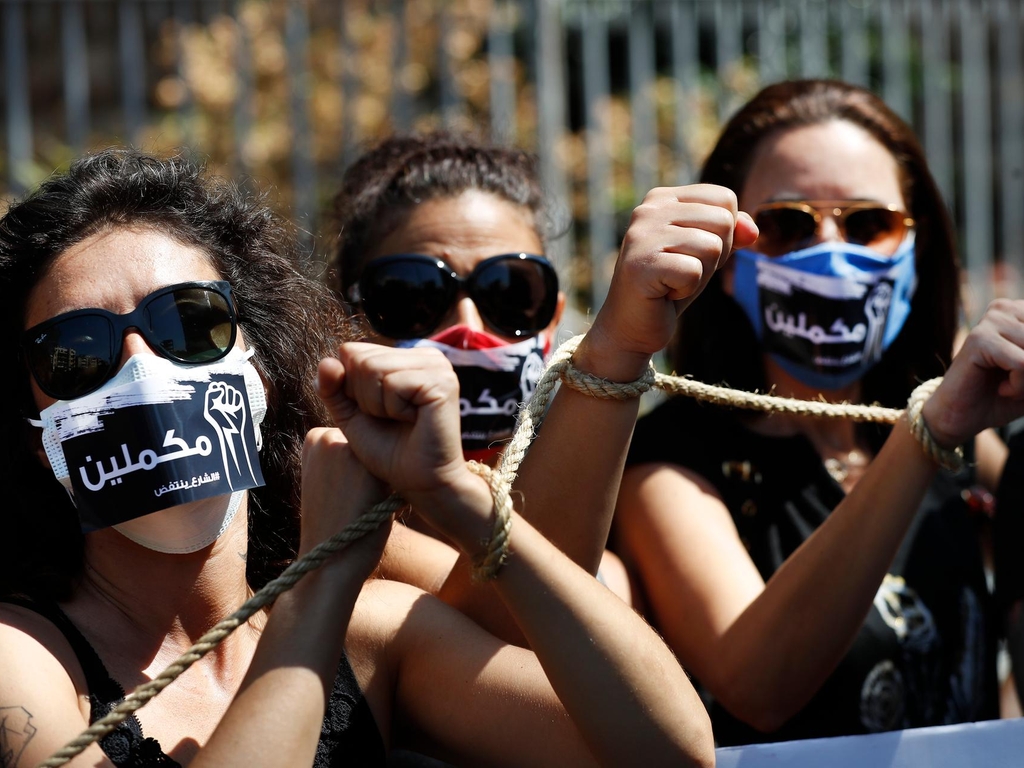Beirut’s elite don’t know what to do with Lebanon besides loot it
Michael Young/The National/December 02/2020
مايكل يانغ/عرب نيوز: النخبة في بيروت لا تجيد غير نهبها
Lebanon has not had a fully functioning government since early August, when Prime Minister Hassan Diab submitted his resignation in the aftermath of the horrific explosion in Beirut port. Since then, he has served in a caretaker capacity. Meanwhile, Saad Hariri, a former prime minister, has attempted to form a government of his own after he was tasked with doing so by a majority of Parliament last October 22.
Mr Hariri has not progressed since then, mainly because of disagreements with President Michel Aoun and the President’s son-in-law, Gebran Bassil, over a number of portfolios, the size of the government and who will appoint Christian ministers. That Lebanon is sinking ever deeper into economic calamity seems to worry the politicians little as they continue to hold tightly to their own political demands.
On the basis of this behaviour alone, to dismiss many of Lebanon’s political and financial leaders as a cartel of criminals would be not far from the truth. After having bankrupted the country through their decades of corruption, thereby robbing millions of citizens of their life savings, they continue to delay all efforts to introduce the reforms necessary to secure financial assistance from the International Monetary Fund.
There is a continuing debate over why Mr Hariri remains unable to form a government. Some insist the problems are external. The militant party Hezbollah, the main powerbroker in Lebanon, is allegedly unwilling to push Mr Aoun and Mr Bassil to compromise because it is waiting to see how the administration of US President-elect Joe Biden will deal with Lebanon once it takes office. Therefore, it prefers to preserve its alliance with both men by avoiding putting pressure on them.
Another version is that Mr Bassil seeks a third of the ministers in any new government, giving him leverage to obstruct all governmental action at the end of Mr Aoun’s term. By doing so, he could increase his pressure on parliamentary blocs to elect him as president to succeed his father in law. Mr Hariri rejects this.
Such explanations may be true in part, but they don’t tell us why the Lebanese system is collapsing so ignominiously. The explanation is more prosaic: the country’s political cartel was able to act cohesively in the past because they all collaborated in pillaging the system. Now that the economy is collapsing, the politicians are divided and in disarray.
In a generalised atmosphere of recrimination, no one, not even Hezbollah, is really able to corral the politicians towards consensus. Division can serve Hezbollah in some ways, because a quarrelling political class is easier for it to control. But this also means havoc in the way the state is run, meaning the militant party could only enter into a conflict with Israel at grave domestic risk. The violent reaction against such a war from a suffering Lebanese population would be difficult to contain if the country’s sectarian political leaders are antagonistic towards one another.
Given the heightened tensions between Israel and Iran, Hezbollah’s main foreign sponsor, in the aftermath of the killing of an Iranian nuclear scientist last week, Hezbollah cannot take this possibility lightly. Lebanon’s chaotic political atmosphere makes the party’s entry into a war highly unfavourable; but trying to impose an end to this situation by pressing for a compromise on the government may alienate leading political actors, such as Mr Aoun, whose support Hezbollah will need in the event of a conflict.
Beyond regional considerations, what does it say about Lebanon that it appears unable to have a cohesive leadership when political elites are unable to divvy up the national pie? It implies that outside of a context of official larceny, the politicians seem to have no notion of how to run the state.
That’s not surprising. When Lebanon’s civil war ended in 1990, the post-war order was built on the wartime sectarian militia leaders, over whom a pragmatic businessman, Rafik Hariri, Saad Hariri’s father, presided as prime minister. That order was orchestrated largely by Syria, which looted the revenues of the system with its political allies. The elder Mr Hariri understood that the only way he could advance his project to rebuild the country was to go along with this setup and ensure that everyone benefited.
Things worked while everyone was making money. However, by 2019 the strains on that system had become evident, as years of decline in capital inflows to Lebanon began undermining a financial sector that could no longer pay for government debt and expenditures. In October of last year, the system began to crumble, while the members of the political class struggled to preserve their shares in it.
This led them to turn against one another. They understood that reform was needed to preserve the corrupt order they had built. But, invariably, they wanted their political enemies to make the sacrifices, not themselves. Suddenly, politicians were accusing their rivals of corruption, portraying themselves as paragons of virtue, leading to a breakdown in the cartel’s unity.
That is where Lebanon stands today. How the country can exit from its deadly impasse remains a mystery. Some might see advantages in the end of the politicians’ code of silence. But the problem is that this is perilous when Lebanon is a drifting ship approaching the reefs. Lebanon’s civil war years were a terrifying chapter in its history, but it is surprising that many Lebanese now find themselves saying that they were less objectionable than what prevails today.
*Michael Young is a senior editor at the Carnegie Middle East Centre in Beirut and a columnist for The National

















